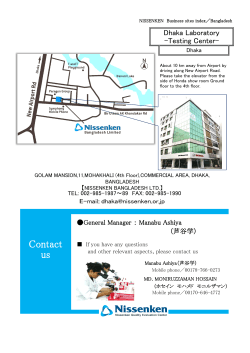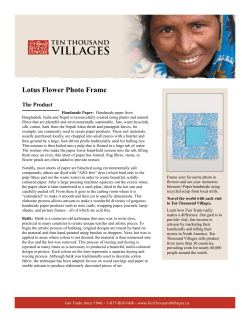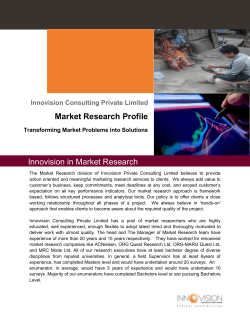
PROJECT BRIEF - COMDIS-HSD
Assessing the effectiveness of using Public-Private Partnerships to improve family planning services in Bangladesh PROJECT BRIEF This study assesses the use of Public-Private Partnerships in providing quality and accessible family planning services in Bangladesh. Background Bangladesh is the 7th most populated country in the world with a growth of 2 million people annually. Increases in population size result in significant burdens on current health services and mean that targets to reduce maternal mortality and other reproductive goals are difficult to achieve. Dhaka is the 4th largest city in the world and prevalence of contraceptive use is approximately 60%. Despite changes in national programmes and policy, there has been very little increase in the rate of modern methods of contraceptive use. Over decades short term methods such as the oral pill appear to have increased and the use of Long Acting Reversible Contraceptive (LARC) Methods has declined. Effective strategies are needed to deliver family planning services to increase the use of LARC methods and alter fertility rates. Study aim To develop a Public Private Partnership (PPP) model to increase access and choice of method for family planning services in urban Bangladesh. to measure the change in the number of couples using LARCM; and Objectives 1. Increase the number of clients using LARC within family planning programmes by engaging with private sector providers; Evaluate the quantitative and qualitative data to compare the private sector providers with those in usual care ‘control’ clinics. In-country partners: 2. Increase knowledge and awareness of LARC, as well as access and use to these methods; Directorate General Family Planning Marie Stopes Bangladesh 3. Increase use of Intra-Uterine Devices (IUDs); and Project duration: April 2014 to March 2016 4. Understand the trend of using IUDs in an urban environment. Potential scaling up of research findings The study The study will compare preand post-intervention observations in private sector clinics with the usual care at ‘control’ clinics. The research will: Assess the local context by measuring the local data, knowledge, attitudes and behaviour of young married couples; Design and pilot a package of services to deliver systematic care for family planning; Pre-test and pilot the intervention over 12 months of Clinic, The Directorate General of Family Planning, Ministry of Health and Family Welfare is involved in the project and is committed to scaling up the project if it is found to be effective. Researchers: Dr Rumana Huque, ARK Foundation; Dr. Mahmudur Rahman, DGFP For more information, email saif.iqbalbd@gmail.com
© Copyright 2025





















